Living in a place where there is hard water can be a real challenge. Not only does it cause reduced water flow and cause limescale build-up, but also all kinds of stains. And if you see the hard water stains on your bathroom tiles, you know you have a serious problem on your hands.
Sure, you can also choose to ignore it but there is a price to pay for it. In the long run, it’s just not going to look good. Thankfully, there are several ways to remove hard water stains. Read on to learn about them.
Table of Contents
How to clean bathroom tiles with hard water stains
When you want to get rid of hard water stains on bathroom tiles, first make a mixture of baking soda and vinegar. Apply the paste on the area with the hard water stain and let it sit for 10 minutes. Rinse the area with clean water.
Steps to Remove Hard Water Stains from Bathroom Tiles
The following are the steps on how you can remove hard water stains using vinegar and baking soda:
Step 1: Create a Paste – Prepare a bowl or container for mixing. Mix equal parts baking soda and vinegar in the bowl or container. The resulting solution is mildly abrasive and should help get the hard water stains off quickly. Because of how abrasive the solution is, mineral deposits on the grout and tile will be easy to remove.
Step 2: Apply the Paste – You need to mix the combination as well as you can. After you are done mixing the paste, apply it on the area that is affected by the hard water stains. If the affected area is very large then you might have to mix up a new batch of the paste.
Once you are done applying, let the paste sit for about 10 minutes. You could then scrub the bathroom tiles and grout using a brush or a sponge. To help you loosen up the buildup of stains, use circular motions when scrubbing the tiles and grout.
Step 3: Rinse – Make sure that you use clean water to rinse the affected area. Rinse the entire area to remove the paste that you applied. Wipe away any excess water on the tiles and grout by using a clean towel or cloth. Do not forget to remove the excess water since it can cause new stains later on.
[crp]
Common Questions About Hard Water Stains
Does Harpic Remove Hard Water Stains?
Yes, Harpic can be used for removing hard water stains. That is indeed the case so you can use the product for areas such as sinks, baths, and showers. You can count on Harpic to make those unwanted and unsightly stains go away in no time at all.
These are the steps that you need to do in order to make Harpic work for you in the removal of hard water stains:
- Get the Hrpic spray. Make sure to spray it directly on the bowl, tub, and the bathroom floor and around it as well. Leave it for about one minute.
- After the one minute is done, wipe everything that was sprayed with the use of a clean and dry cloth.
- Use warm water to rinse it carefully and thoroughly. Buff it to shine with the use of a microfiber cloth. Make small circular motions with the cloth.
What Color is Limescale?
If your home has hard water then chances are that you are dealing with limescale as well. Limescale is also known as calcium carbonate and its color ranges from white to green.
Limescale forms when the hard water streams from the showerhead and proceeds to cling to the tiles, glass, and fixtures. The hard water would then evaporate and leave the deposits behind.
Of course, limescale also occurs in other places and not just in the shower. A few examples of those places include fixtures, dishwashers, and pipes.
The key to the effective removal of limescale is to make sure that you are able to cut through the mineral build-up. And all that while having minimal to no abrasion.
Do Water Filters Stop Limescale?
Water filters can be used to remove limescale. There are several types of filters that can be used for the purpose. One of those is the scale inhibition filter. To stop limescale from forming, this type of filter uses a phosphate-based chemical that will pre-react with the water’s hardness.
There are also the combined scale removal filters. These filters utilize multiple media types. And that includes granular activated carbon that is combined with phosphate. They can also contain water softening resin or pyrolox. And these filters can either prevent limescale deposits or remove manganese and iron depending on the kind of filter media that they contain.
These filters are capable of transforming calcium ions to calcium crystals to prevent the buildup of limescale deposits. The combined filters can also help balance out the side effects like acidity or sodium.
Conclusion
Spotting hard water stains on your bathroom tiles is a cause for irritation. It just does not look good in any way. But sometimes, we can get lazy and have a tendency to ignore such stains. The best thing to do is to ignore the onset of such laziness and act right away. There are plenty of ways to remove the stains and you should use any of them to keep your bathroom tiles immaculately clean and stain-free.


